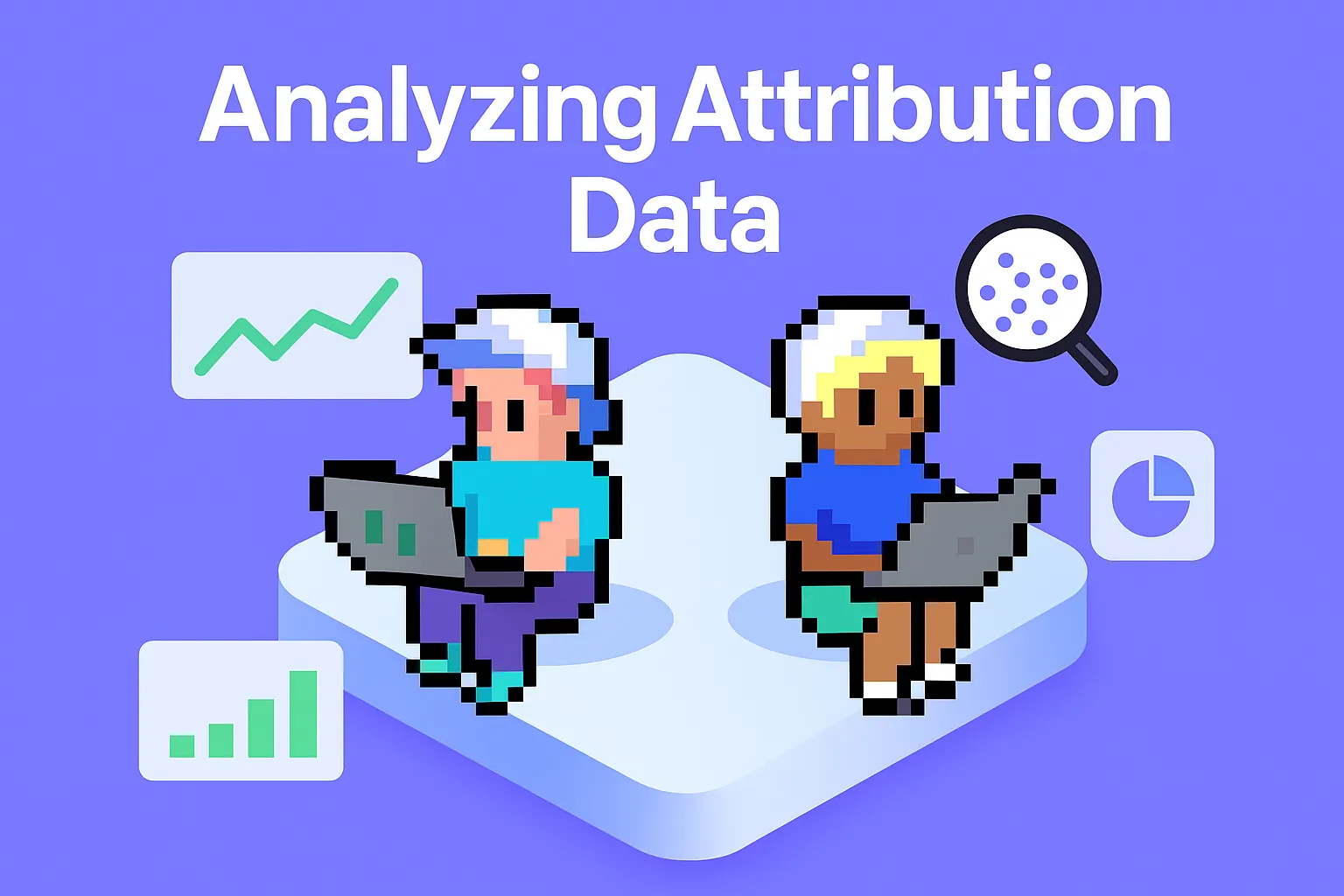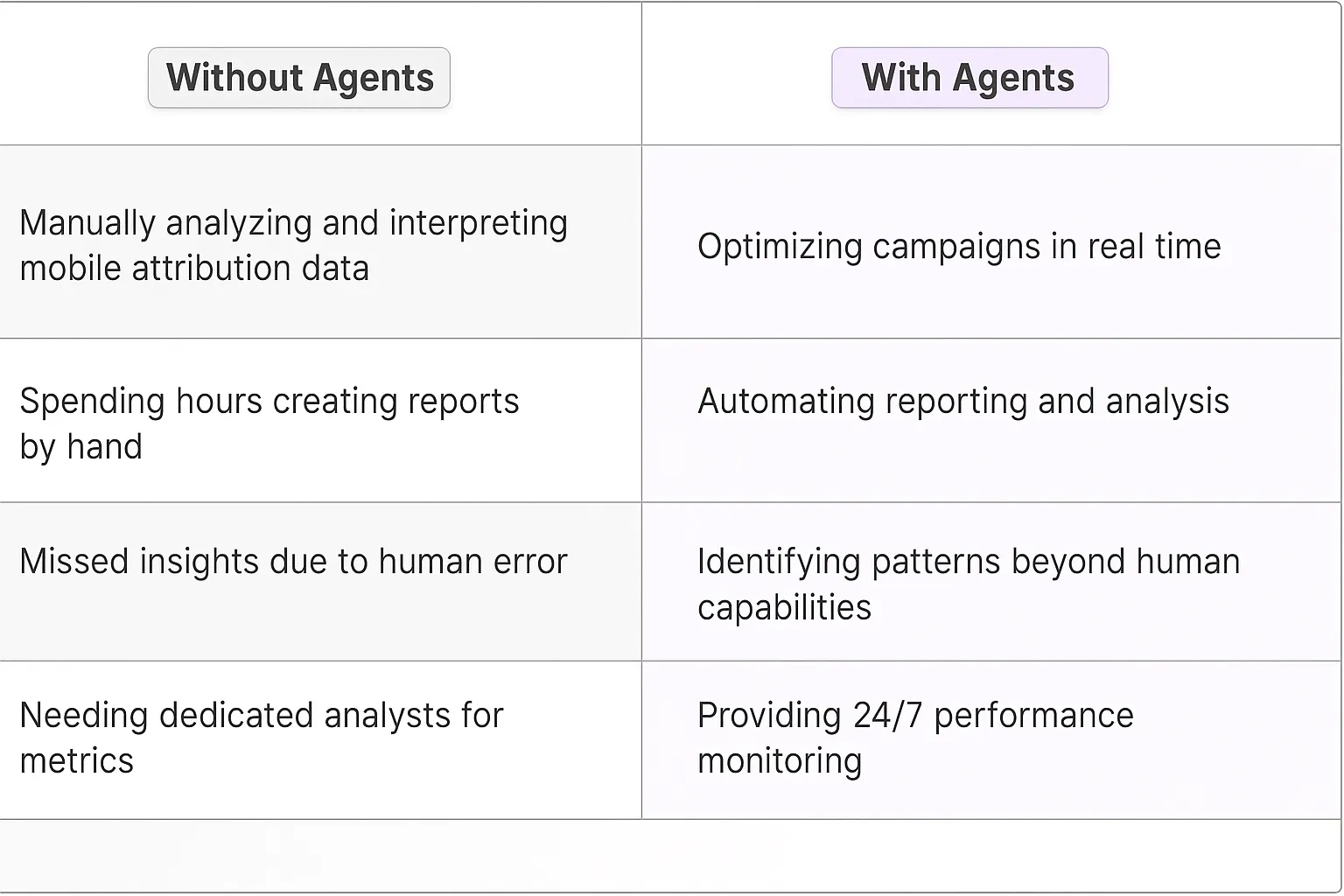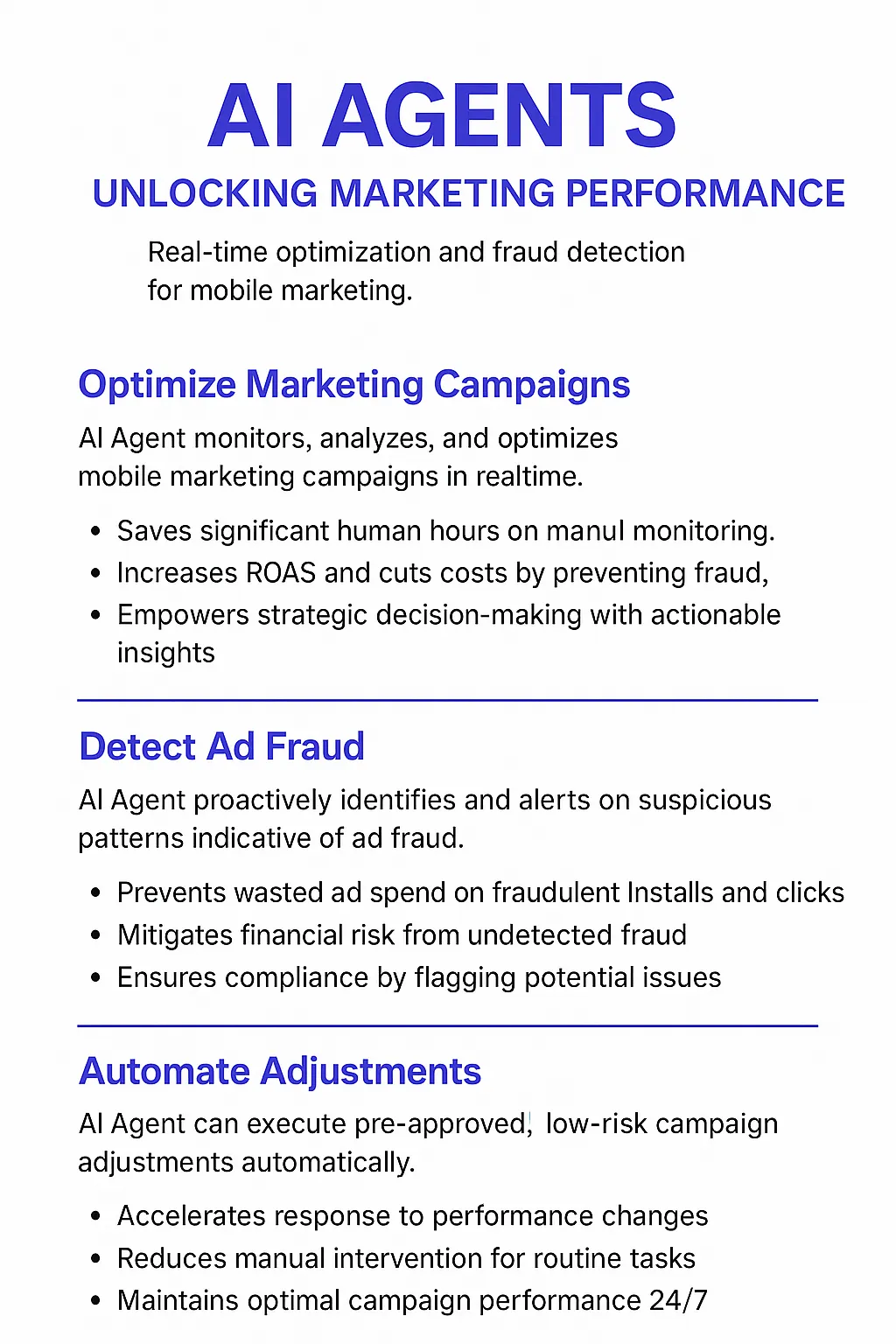AppsFlyer
Understanding AppsFlyer's Mobile Attribution Platform
AppsFlyer stands as a leading mobile attribution and analytics platform that helps marketers track and measure their marketing campaigns across multiple channels. The platform provides granular insights into user acquisition, retention, and engagement metrics, enabling data analytics for mobile-first companies. With advanced fraud prevention and deep linking capabilities, AppsFlyer serves as the source of truth for mobile marketing performance.
Key Features of AppsFlyer
- Mobile attribution tracking across multiple channels and platforms
- Deep linking and deferred deep linking capabilities
- Advanced fraud prevention and detection
- Cohort analysis and user lifetime value tracking
- Real-time data analytics and reporting
- Integration with major advertising platforms
- Privacy-compliant measurement solutions

Benefits of AI Agents for AppsFlyer
What would have been used before AI Agents?
Marketing teams traditionally relied on manual data analysis and interpretation of AppsFlyer's mobile attribution and analytics. This meant spending countless hours digging through dashboards, cross-referencing data points, and creating reports by hand. The process was not only time-intensive but prone to human error and missed insights. Teams often needed dedicated analysts just to make sense of complex user acquisition and retention metrics.
What are the benefits of AI Agents?
AI Agents transform how teams interact with AppsFlyer's robust dataset in three key ways:
Real-time Campaign Optimization
Digital teammates can monitor campaign performance 24/7, detecting anomalies and shifts in key metrics like cost per install (CPI) and return on ad spend (ROAS). When performance dips below set thresholds, the AI immediately alerts teams and suggests data-driven adjustments to campaign parameters.
Advanced Pattern Recognition
AI Agents excel at identifying complex patterns across user acquisition channels that human analysts might miss. They can spot correlations between ad creative performance, user behaviors, and conversion rates across different segments and markets. This deeper analysis leads to more precise targeting and higher ROI.
Automated Reporting & Analysis
Rather than spending hours manually compiling reports, teams can ask AI Agents to generate comprehensive analysis in seconds. The AI pulls relevant data points, creates visualizations, and provides actionable insights in natural language. This frees up marketing teams to focus on strategic decisions rather than getting lost in spreadsheets.
Predictive Analytics
By analyzing historical performance data, AI Agents can forecast future trends and campaign outcomes with remarkable accuracy. This helps teams allocate budgets more effectively and adjust strategies proactively rather than reactively. The AI can predict which user segments are likely to have the highest lifetime value and recommend optimal bidding strategies for different channels.
The shift from manual analysis to AI-powered insights represents a fundamental evolution in how mobile marketing teams operate. With AI Agents handling the heavy lifting of data analysis, teams can move faster, make better decisions, and drive stronger results from their user acquisition efforts.

Potential Use Cases of AI Agents with AppsFlyer
Processes
- Campaign Performance Analysis: AI agents analyze complex mobile attribution data across multiple channels, identifying key performance patterns and anomalies that impact ROI
- Cohort Behavior Tracking: Digital teammates monitor user cohorts continuously, detecting behavioral shifts and engagement patterns that signal retention opportunities
- Fraud Detection Monitoring: AI agents scan traffic patterns in real-time, flagging suspicious activities and potential fraud schemes before they impact campaign budgets
- Cross-Platform Attribution: Digital teammates connect user journeys across devices and platforms, building comprehensive attribution models that reveal true conversion paths
Tasks
- Generate custom performance reports by pulling specific metrics and KPIs based on natural language requests
- Monitor and alert marketing teams when campaign metrics deviate from expected benchmarks
- Analyze user acquisition costs across different channels and automatically suggest budget optimization opportunities
- Create audience segments based on behavioral patterns and engagement metrics
- Track competitor app performance and market positioning through AppsFlyer's marketplace data
- Calculate and report ROAS (Return on Ad Spend) across multiple campaigns and channels
- Identify and categorize install sources to optimize user acquisition strategy
- Monitor SDK integration health and alert developers about implementation issues
Growth Impact Analysis
Mobile growth requires deep understanding of attribution data - the connective tissue between marketing spend and user actions. AI agents transform AppsFlyer's rich dataset into actionable growth levers. They detect micro-conversion patterns that humans might miss, identify high-value user segments, and surface opportunities for campaign optimization.The real power emerges when digital teammates start connecting previously siloed data points. They can trace user journeys across channels, devices, and time periods to reveal the true impact of marketing activities on retention and revenue. This multi-touch attribution insight helps growth teams allocate resources to channels that drive sustainable user growth, not just short-term spikes.For mobile-first companies, these AI capabilities effectively create a second growth team - one that works 24/7 to surface opportunities, catch issues early, and ensure marketing spend generates maximum impact. The combination of human strategic thinking and AI-powered analysis creates a powerful engine for sustainable mobile growth.

Industry Use Cases
AI agents within AppsFlyer transform how mobile marketers and app developers approach their daily operations. The integration of these digital teammates creates entirely new possibilities for data analysis, user acquisition, and marketing optimization that weren't feasible with traditional tools and manual processes.
From gaming studios tracking user acquisition costs across multiple channels to fintech companies analyzing user retention patterns, AI agents adapt to diverse industry requirements. They excel at parsing complex attribution data, identifying fraud patterns, and extracting actionable insights from vast datasets that would typically require teams of analysts.
The real power lies in how these AI agents handle industry-specific challenges. For mobile gaming companies, they can analyze player behavior patterns and correlate them with acquisition sources. E-commerce apps can track the entire customer journey from ad impression to purchase, while subscription-based services can better understand churn indicators and lifetime value metrics.
What makes these use cases particularly compelling is their ability to scale. Whether you're a startup monitoring your first user acquisition campaign or an enterprise managing millions in ad spend, AI agents adjust their analysis depth and scope to match your needs.
Gaming Industry: Maximizing Player Acquisition with AppsFlyer AI
Mobile game developers face intense competition for player attention and retention. The gaming vertical demands precise attribution and engagement data to optimize user acquisition costs while maintaining healthy player lifetime value (LTV). AppsFlyer's AI capabilities transform how gaming companies approach these challenges.
A mid-sized mobile game studio can deploy AppsFlyer AI to analyze complex player behavior patterns across their portfolio. The AI examines granular data points like first-time purchase timing, session frequency, and social sharing activities to identify the highest-value player segments. This deep behavioral analysis goes beyond traditional cohort analysis by uncovering non-obvious correlations between early gameplay patterns and long-term monetization potential.
For example, when launching a new casual puzzle game, the AI can detect that players who complete tutorial levels in 3-5 minute intervals (rather than rushing or taking too long) show 40% higher 30-day retention. The marketing team can then optimize ad targeting to reach similar users who match these behavioral markers.
The AI also provides predictive churn analysis by monitoring subtle changes in playing patterns - like shortened session lengths or decreased social interactions - that typically precede player drop-off. This enables gaming companies to trigger targeted re-engagement campaigns before players fully churn.
Most critically, AppsFlyer's AI helps gaming companies solve the attribution puzzle across an increasingly fragmented mobile advertising landscape. By analyzing historical campaign performance data, the AI can automatically adjust attribution models to account for platform-specific behaviors - like the tendency for iOS users to convert more slowly than Android users in certain game genres.
The end result is more efficient player acquisition spending and higher ROI on marketing investments. Gaming companies using these AI capabilities typically see 25-35% improvements in day-7 retention rates and 15-20% reductions in cost per loyal player.
E-commerce Growth: Data-Driven Customer Acquisition with AppsFlyer AI
E-commerce companies operate in a hyper-competitive space where customer acquisition costs keep climbing while attention spans shrink. The most successful digital retailers have shifted from gut-based marketing to sophisticated AI-powered attribution - and AppsFlyer's AI capabilities are driving this transformation.
A direct-to-consumer fashion brand recently deployed AppsFlyer AI to decode the complex journey between first ad impression and final purchase. The AI analyzed millions of customer touchpoints, revealing that users who engaged with Instagram Story ads followed by email remarketing converted at 3x the rate of single-channel prospects. This insight led to a complete restructuring of their marketing funnel.
The AI's deep learning models excel at identifying high-value customer segments based on subtle behavioral patterns. For example, the system detected that mobile app users who added items to wishlists within 48 hours of install generated 65% more lifetime value than average customers. This granular insight enabled precise targeting of similar high-potential segments.
Beyond acquisition, AppsFlyer AI tackles the growing challenge of attribution in a privacy-first world. The system continuously adapts its probabilistic modeling to maintain accuracy even as tracking capabilities evolve. When iOS 14.5 privacy changes disrupted traditional attribution methods, the AI automatically adjusted its models to maintain 90%+ accuracy through aggregated data analysis.
The platform also provides predictive analytics for inventory planning. By analyzing historical purchase patterns alongside marketing attribution data, the AI forecasts demand spikes with 85% accuracy. This helps e-commerce companies optimize stock levels and marketing spend simultaneously.
E-commerce brands implementing these AI capabilities typically see their customer acquisition costs drop by 30-40% while conversion rates increase 20-25%. The system's ability to process vast amounts of data and surface actionable insights transforms marketing from an art to a science.
Considerations and Challenges
Technical Challenges
Implementing AppsFlyer AI agents requires careful navigation of several technical hurdles. Data integration complexity stands out as a primary concern - AppsFlyer's rich attribution data needs precise mapping to train AI models effectively. Teams often struggle with data quality issues, especially when merging multiple data sources like in-app events, marketing campaigns, and user acquisition metrics.
API rate limits pose another significant challenge. AppsFlyer's APIs have specific throughput restrictions that can bottleneck AI agent performance during high-traffic periods. Engineering teams need to implement sophisticated queuing and caching mechanisms to handle these limitations gracefully.
Operational Challenges
The operational landscape presents its own set of obstacles. Training team members to effectively utilize AI agents alongside AppsFlyer's existing analytics tools requires substantial investment. Marketing teams often face a learning curve in translating their traditional attribution analysis workflows into AI-powered processes.
Privacy compliance adds another layer of complexity. AI agents must be configured to handle user data in accordance with GDPR, CCPA, and other regional privacy regulations. This often necessitates creating robust data governance frameworks and implementing strict access controls.
Integration Considerations
Success with AppsFlyer AI agents depends heavily on thoughtful integration planning. Teams need to establish clear metrics for measuring AI performance against existing attribution methods. This includes setting up A/B testing frameworks to validate AI-driven insights against traditional analytics approaches.
Cross-functional alignment becomes crucial - marketing, product, and engineering teams must collaborate closely to define success metrics and establish feedback loops for continuous improvement. Organizations should also plan for regular model retraining as marketing patterns and user behaviors evolve.
The Future of Mobile Marketing Analytics: AI and Attribution
The marriage of AI Agents with AppsFlyer's attribution platform marks a significant evolution in mobile marketing analytics. These digital teammates eliminate countless hours of manual analysis while uncovering insights that would be impossible to detect through traditional methods. As privacy regulations tighten and the mobile ecosystem grows more complex, the role of AI in marketing attribution becomes increasingly critical. Organizations that successfully implement these AI capabilities gain a significant competitive advantage in user acquisition, retention, and overall mobile growth strategy.













